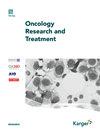表皮生长因子受体-TKI联合放疗治疗105例脑转移肺腺癌患者:预后因素分析回顾性研究。
IF 1.6
4区 医学
Q3 ONCOLOGY
引用次数: 0
摘要
方法收集2021年1月至2024年1月河北北方学院第一附属医院肺腺癌患者的临床病理资料。采用 SPSS 26.0 版统计软件进行统计分析。结果105例患者纳入研究。1、2、3年总生存率(OS)分别为82.9%、61.2%和33.7%。1、2、3 年无进展生存期(PFS1)分别为 62.7%、36.6% 和 22.1%。1、2、3年无进展生存期2(PFS2)率分别为80.8%、54.6%和31.4%。中位 OS、PFS1 和 PFS2 分别为 29.8、18.0 和 28.1 个月。COX多变量分析显示,基因突变状态和脑放射剂量是OS的独立预后因素;基因突变状态、脑放射剂量和对初始治疗的反应评估(反应评估)是PFS1的独立预后因素;临床分期、基因突变状态、脑放射剂量和反应评估是PFS2的独立预后因素。完全缓解(CR)+部分缓解(PR)与更长的PFS1和PFS2有关,IVA期患者的PFS2更长。本文章由计算机程序翻译,如有差异,请以英文原文为准。
EGFR-TKI combined with radiotherapy in 105 patients of lung adenocarcinoma with brain metastasis: a retrospective study of prognostic factors analysis.
INTRODUCTION
This study aimed to retrospectively analyze the response and prognosis factors for patients of lung adenocarcinoma with brain metastasis and epidermal growth factor receptor (EGFR) mutation, who were treated by EGFR-tyrosine kinase inhibitor (TKI) combined with brain radiotherapy (RT).
METHODS
From Jan 2021 to Jan 2024, the clinicopathological data of lung adenocarcinoma patients were collected from the First Affiliated Hospital of Hebei North University. SPSS version 26.0 statistical software was used for statistical analysis. P < 0.05 was determined to be statistically significant.
RESULTS
105 patients were included. The 1, 2, 3-year overall survival (OS) rate was 82.9%, 61.2%, and 33.7%, respectively. 1, 2 ,3-year progression-free survival 1 (PFS1) rate was 62.7%, 36.6%, 22.1%. 1,2,3-year PFS2 rate was 80.8%, 54.6%, and 31.4%. The median OS, PFS1 and PFS2 was 29.8, 18.0 and 28.1 months, respectively. The COX multivariate analysis showed that gene mutation status and brain radiation dose were independent prognostic factors for OS; Gene mutation status, brain radiation dose, and response evaluation to initial treatment (response evaluation) are independent prognostic factors for PFS1; Clinical stage, gene mutation status, brain radiation dose, and response evaluation are independent prognostic factors for PFS2.
CONCLUSION
TKI combined with brain radiotherapy is effective on lung adenocarcinoma patients with EGFR mutation and brain metastasis. Patients with 19 Del or 21 L858R mutation and brain radiation doses ≥ 40 Gy have longer OS, PFS1, and PFS2, and complete remission (CR) + partial remission (PR) is associated with longer PFS1 and PFS2, Patients in stage IVA have longer PFS2.
求助全文
通过发布文献求助,成功后即可免费获取论文全文。
去求助
来源期刊

Oncology Research and Treatment
ONCOLOGY-
CiteScore
3.20
自引率
0.00%
发文量
84
期刊介绍:
With the first issue in 2014, the journal ''Onkologie'' has changed its title to ''Oncology Research and Treatment''. By this change, publisher and editor set the scene for the further development of this interdisciplinary journal. The English title makes it clear that the articles are published in English – a logical step for the journal, which is listed in all relevant international databases. For excellent manuscripts, a ''Fast Track'' was introduced: The review is carried out within 2 weeks; after acceptance the papers are published online within 14 days and immediately released as ''Editor’s Choice'' to provide the authors with maximum visibility of their results. Interesting case reports are published in the section ''Novel Insights from Clinical Practice'' which clearly highlights the scientific advances which the report presents.
 求助内容:
求助内容: 应助结果提醒方式:
应助结果提醒方式:


